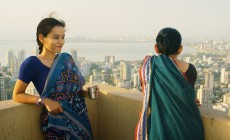『あなたの名前を呼べたなら』 ロヘナ・ゲラ監督来日インタビュー“正しいことだと信じていて、同調しなければならないと感じていると、どれほど自分が無理しているのかも気づかないのです”/Interview with Rohena Gera about “Sir”
NeoL / 2019年8月1日 17時0分
『あなたの名前を呼べたなら』 ロヘナ・ゲラ監督来日インタビュー“正しいことだと信じていて、同調しなければならないと感じていると、どれほど自分が無理しているのかも気づかないのです”/Interview with Rohena Gera about “Sir”
今でも階級制度が深く根付いたインド。その最大の都市ムンバイを舞台に、身分の異なる男女の恋を描いたラブストーリー『あなたの名前を呼べたなら』が8月2日に日本公開される。主人公のラトナは農村出身。村で結婚したものの数ヶ月で未亡人になってしまい、ムンバイで建設会社の御曹司アシュヴィンのメイドとして働いている。貧しいながらも妹に教育を受けさせ、自らもファッションデザイナーになる夢を持つ強い女性だ。一方のアシュヴィンは裕福で一見何もかも持っているようだが、婚約者と破局し、家業を継ぐために夢を諦め、決して幸せには見えない。色彩の美しい映像が印象的な映画は、少しずつ惹かれ合っていく2人の心情を丁寧に紡ぎ出す……。日本に暮らす者にとっては美しい恋物語に思えるが、インド出身のロヘナ・ゲラ監督いわく、これはインド人からすると「不可能」なストーリーなのだという。それほど明確に存在する身分制度や差別意識に対して、幼い頃から抱き続けた思いがきっかけとなった長編デビュー作について、公開を前に来日を果たした監督に話を聞いた。(→ in English)
――なぜ階級の異なる男女のラブストーリーを伝えようと思ったのですか?
ロヘナ・ゲラ監督「インドにおける階級の問題について、私は人生を通してずっと悩んできました。それは子どもの頃から家庭内に存在しており、差別のある家の中で生活するのはとても奇妙なものでした。たとえ小さな子どもでも気づくものです。何かがおかしいと感じるわけです。でも、そのことについてどうやって対処するべきか、どうやって話せばいいのか、私にはわかりませんでした。階級については家族とですら話したことがありません。自分の母親にも話したことがないのです。でも、それは常に自分の中にあるもので、自分がこのシステムの一部であることを長年にわたって心苦しく思ってきました。迫害する側の立場にいるわけですから、とても辛いものです。階級の違いは公然たる事実で、自分も日常的に認識しているわけですから」
――本作が長編デビュー作だそうですね。
ロヘナ・ゲラ監督「そうです。ドキュメンタリー(2013年の『What’s Love Got to Do with It?』)を撮った後、私は様々な形の愛について考えていました。人が愛する相手をどのように選ぶのかを考えていて、本作のような登場人物が織りなす、ありえないようなラブストーリーを描こうと考えたのです。そのようなラブストーリーであれば、階級の問題について興味深い形で取り組めますし、2人を平等に描くことができます。彼らは同等に恋に落ちるのです。きっと長編デビュー作として面白いアプローチになると思いました。デビュー作というのは難しいものです。大切なテーマだからこそ、そのために闘おうと思えるので、私は自分にとって本当に大切なテーマを選んでよかったと思っています。デビュー作は自分が信じているやり方で撮るべきです。ですので、このテーマは私にとって大きな意味を持つものであり、とても私的なものです」

――インドでは他の人も階級システムについてあなたと同じように感じているのでしょうか? 階級システムはタブーなのですか? それとも、何とも思っていない人が多いのですか?
ロヘナ・ゲラ監督「人によります。例えば、子どもの教育の面で従業員に協力する雇用主は多いです。教育費を与えたり、医療費を出したりするのです。相手に対して、自分が非常に恵まれた立場にいることは認識しているわけですよね。でも、多くの人はそれ以上深く考えません。『OK、自分は恵まれている。恵まれた家庭に生まれて幸運だ』と思うだけです。私は相手を尊重することが大切だと思っています。低レベルの仕事に就いているからといって、低レベルの人間であるわけではないのですが、インドではそのように考えがちです。仕事で人を判断するのです」
――日本でもあり得ることだと思います。
ロヘナ・ゲラ監督「例えば、あなたのような教養のあるジャーナリストが、教養のない警備員と恋に落ちたとします。日本の文化では、それは難しいことですか? それとも特に問題はないですか?」
――人によりますが、問題視する親もいると思います。
ロヘナ・ゲラ監督「ですよね。(差別は)どこにでもあるのです」

――だと思います。でも、劇中で主人公のラトナがブティックに行くシーンはショッキングでした。店員は彼女が店に入ってきたことを、あからさまに嫌がっていましたね。
ロヘナ・ゲラ監督「ああいったことは非常に明確に行われています。インドでは見た目ですぐに階級の違いを判断されるのです」
――それは服装のせいなのですか?
ロヘナ・ゲラ監督「いろいろなことです。決してラトナがサリーを着ているからではありません。上流階級の女性たちもサリーを着ます。ただ、サリーの着方や歩き方、履いている靴や髪型などにより、すぐに労働者階級だとわかるのです。劇中ではあまり大げさにはしたくなかったので、女性は怒鳴ってはいません。ただ、“ここはあなたの居場所ではない”と、とても明瞭に伝えるだけです」
――なるほど。
ロヘナ・ゲラ監督「でも率直に言って、本作はインドが舞台だけれど、有色人種の私が普段着ているようなカジュアルなジーンズとTシャツ姿で、訛りのあるフランス語を話しながらフランスの高級ブティックに入ったら、同じような扱いを受けるのではないかと思います」

――ラトナは決して楽な人生ではないのに強くて夢があり、自尊心のある女性として描かれているところに好感が持てました。彼女を通して伝えたかったことは?
ロヘナ・ゲラ監督「私にとっては、自尊心や夢を持つこと、そして自己の中心であることの重要性を伝えることが非常に大切でした。ラトナはとても辛い人生を歩んできましたが、楽観的であることを選んでいます。夢を持ち続け、闘い続けることを選んでいるのです。私は自分の周りにいる女性たちのそのようなところに、とても感銘を受けます。それに、ラトナと雇用主のアシュヴィンを比較してみると、彼はすべてを手にしているのに自分を見失っており、夢もなく、何かのために闘っているわけでもない。金の鳥かごの中で暮らしており、ある意味みじめなのです。自分に正直であること、それが何であれ、自分が信じていることのために闘うことが大切だと思います。それに、私はラトナを被害者として描きたくありませんでした。彼女は興味深いダイナミックな女性だからこそ、アシュヴィンは恋に落ちるのです。彼女は被害者ではありません」
――先ほど階級についてはお母さんとも話したことがないとおっしゃっていましたが、お母さんは映画を観ましたか?
ロヘナ・ゲラ監督「観ました。それに映画祭では、多くのインド人に本作を観てもらいました」
――彼らの反応は?
ロヘナ・ゲラ監督「それはわかりません。私はインドの人々の反応が知りたいと思っています。アメリカに住むインド人たちとはニューヨークで一緒に観たのですが、彼らはとてもポジティブな反応を示してくれました。それにダラスで開催された映画祭では評判が良くて、たくさんの賞をいただきました。でも、インドで公開したときにどのような反応が得られるのかを早く知りたいです。公開までに時間がかかっている理由は、ちゃんと注目してほしいからです。インドではアート系の映画はあまりサポートされていません。公開されても知られないことが多いのです。私はちゃんと本作が見てもらえるよう闘うつもりです。そして、できればこの物語を信じてくれる人がいるといいなと思います。嫌う人もいるでしょう。でも、少なくともこのような問題や私たちの生き方について、語り合うきっかけになったらうれしいです。だからこそ、私はこの映画を作ったのです」

――若い世代では考え方は変わってきているのでしょうか?
ロヘナ・ゲラ監督「考え方は変わってきていますが、階級については変わっていません。若い世代の中にも深く根付いているのです。若者たちの方が礼儀正しいかもしれないですが、根本的には変わっていません」
――日本の観客には本作を観て何を感じてほしいですか?
ロヘナ・ゲラ監督「私たちとは違う社会で暮らしているとはいえ、(日本人には)違った意味でたくさんのプレッシャーがあるのではないかと思います。決まった行動をとることや、成功や仕事といったことに縛られているように思えます。劇中のラトナは自尊心がありダイナミックな女性です。何も持っていないけれど、エキサイティングな人です。アシュヴィンが(あのような状況に)閉じ込められていることを考えると、自由であることや解放されることの意味について考えさせられるのではないでしょうか。仕事熱心なのは素晴らしいことですが、少なくとも自分が大好きなことを仕事にするべきです。自分の居たい場所に拠点をおくべきだと思います」
――それは日本に住む多くの人にとって重要なメッセージだと思います。
ロヘナ・ゲラ監督「特に一部の文化においては、すごく難しいことですよね。プレッシャーがたくさんあるわけですから。少なくともインドでは、とても見えにくいプレッシャーがあります。それが正しいことだと信じていて、同調しなければならないと感じていると、どれほど自分が無理しているのかも気づかないのです。少なくともインドでは、見えにくいプレッシャーの下で、認めてもらうために(知らぬ間に)何かをしていることがあります。ルールさえ守っていれば様々なことが可能になって、物事はすごく順調に進むのです。私のドキュメンタリーでも、良き妻になるために妥協する女性と妥協しない女性の置かれている状況は明確に違いました。妥協できる女性は美しい豪華な結婚式ができて、みんなから祝福されるのです。規則を守ると常に報酬が与えられます。プレッシャーは微妙なもので、誰も“女性はキャリアを持つべきではない”とはっきりとは言いません。でも、社会が求めているように行動すると、さりげなく報酬が与えられるのです。そういったプレッシャーは存在すると思います。日本の女性はとてもクールで先進的に見えますが、きっと誰もがそういった悩みを抱えているのではないでしょうか」
――今後のご活躍も楽しみにしています。次に予定している作品は?
ロヘナ・ゲラ監督「最終的に何をするかはわからないけれど、旅を終えて執筆を始めたら何かしら企画することができるはず(笑)。今もたくさんのアイデアが浮かんでいます。特定の事柄に対して自分が抱いている意見は、必ず作品にも忍び込むことになると思います。必ずしも社会正義についての作品ではなくても、そういった問題が忍び込んだものになるでしょう。だから、私は時々自分のことを”コソコソした活動家”と説明しています(笑)。自分の言いたいことを、誰かの頭を叩くのではないやり方で伝えるのです」
――そうした方が、メッセージがちゃんと伝わりますよね。
ロヘナ・ゲラ監督「ええ、その方が話を聞いてもらえると思います。怒鳴っている人の話を聞く人はいないでしょう? 私も怒鳴るような人の話は聞きません。誰かを説得したければ、もっとさりげない方法で伝えるべきです。次回作はわからないけれど、常に自分が立ち戻るテーマが存在するのは確かです」
text Nao Machida
『あなたの名前を呼べたなら』
オフィシャルHP:anatanonamae-movie.com
8月2日(土)より、Bunkamuraル・シネマほか全国順次公開
監督・脚本:ロヘナ・ゲラ
出演:ティロタマ・ショーム『モンスーン・ウエディング』、ヴィヴェーク・ゴーンバル『裁き』、 ギータンジャリ・クルカルニー『ガンジスに還る』
2018年/インド・フランス合作/ヒンディー語・英語・マラーティー語/ビスタ/デジタル5.1ch/99分
後援:日印協会 提供:ニューセレクト 配給:アルバトロス・フィルム
(c)2017 Inkpot Films Private Limited,India
【ストーリー】
経済発展著しいインドのムンバイ。農村出身のメイド、ラトナの夢はファッションデザイナーだ。夫を亡くした彼女が住み込みで働くのは、建設会社の御曹司アシュヴィンの新婚家庭・・・・。のはずだったが、結婚直前に婚約者の浮気が発覚し破談に。広すぎる高級マンションで暮らす傷心のアシュヴィンを気遣いながら、ラトナは身の回りの世話をしていた。ある日、彼女がアシュヴィンにあるお願いをした事から、2人の距離が縮まっていくが・・・。
(This interview is available in English)

――Why did you decide to tell this story?
Rohena Gera: This class issue is something that I’ve struggled with my whole life. As a child, it was present in my home, and to be living with segregation in your own home was very strange. And you feel it even as a small child. You feel that there is something wrong with this picture, you know? I never really knew how to address it or how to talk about it. I've never spoken about it even actually to my family. I never ever mentioned it to my mum. But I carried it in me, and it was something I felt quite terrible about for many years that I'm part of this system. And I'm the class of the oppressor, right? So it was quite hard. It's in your face everyday and you are aware of that everyday.
――This is your first feature film, right?
Rohena Gera: Yes. After my documentary, I was thinking about all these ideas of love, how we choose to love who we love, and somehow it just came to me to do an impossible love story with these kinds of characters. And I thought that would be a way to address this issue but in a way that's interesting, that challenges our ideas, that makes these two people equal. In a way, you can make them both equal, they both equally fall in love. I thought that would be an interesting approach for me for the first film. It's always really hard to make your first film. And I'm glad I chose the subject I really care about, because then, you are willing to fight for it. You really have to do it the way you believe in doing something for the first film. So yeah, it really means a lot to me. It's very personal for me.

――Do other people feel that way, too? Is it something like an elephant in the room that people don't talk about? Or people just don't think anything about it?
Rohena Gera: It depends on the people. For example, there are a lot of people who help their staff by educating their children. They give them money for education or help them with their medical expenses if there is a problem. There is definitely a feeling of being aware of your extreme privilege compare to this person, you know? But a lot of people don't question it deeper than that. They feel like, "Ok, I'm privileged. I'm lucky about where I was born," and that's it. To me, I think it's important to respect someone. Because even if they have a low level job, that doesn't mean that they are low level persons. And I think we tend to think that way very often in India. We judge people by the jobs that they have.
――It could happen in Japan as well.
Rohena Gera: Let's say someone like you, who is a journalist and an educated person had to fall in love with a security guard with no education. How difficult would that be in your culture? Would that be easy?
――Some parents might not be happy.
Rohena Gera: Yeah. I think it's there. It's everywhere.

――Yeah, I think so. However, it was quite shocking to see how Ratna was treated when she went into the store in the film. The sales clerk was very unhappy to see her in the store.
Rohena Gera: Those things are very clear. I think visually you can very quickly judge people's class in India.
――Is it the way you dress?
Rohena Gera: It's many things. It's not that she's wearing a sari because a lot of upper class women also wear a sari. It's the way she's wearing it, it's the way she walks, it's the kind of slippers she wears, the way her hair is done... There is a way you see a working class look. It's very quick. I tried not to make it too loud in a sense that the woman doesn't yell at her. It was just very clear that this is not your place.
――I see.
Rohena Gera: And you know frankly, I think we say that it's about India and everything, but I think if I, as a person of color, was to wear what I normally wear which is really casual like jeans and a t-shirt, and speak French with an accent, and walk into a very fancy high end boutique in France, I might get a similar treatment.

――I love how you depicted Ratna as a strong woman who has a dream and self-respect even though she is living a tough life. What did you want to convey through this character?
Rohena Gera: I think for me it was really important to show that the importance of self-respect, and having your dream and being centered. She's had a very difficult life, but she's choosing to be optimistic. She's choosing to keep her dream and to fight for something. And it's something I find really inspiring in what I see in women around me. Also, if we compare her to Ashwin, he has everything. But he's so lost and sort of miserable because he doesn't have a dream, he's not fighting for anything, and he's just living in this gilded cage. It's important to be true to yourself and to fight for what you believe in whatever that may be. And also, I didn't want her to be a victim. I think she's an interesting dynamic woman that is why he falls in love with her, you know? She's not a victim.
――You said you never mentioned about this class issue to your mum, but has she seen the film yet?
Rohena Gera: My mum saw the film. A lot of Indian people have seen the film at festivals.
――What did they think about it?
Rohena Gera: That I don't know. I would really like to see the reaction of the cinema of the Indian people. I saw the film in New York with Indians in the US, and they had a very positive response. People really liked the film there in Dallas at DFW South Asian Film Festival so we've got a bunch of awards. But I'm really waiting to see how it would be received when it's out in India. And the reason that it's taking so long is because I wanted to get some attention. In India, art house films don't get a lot of support. So often you get it released but nobody even knows it's there. So I want to try to fight for the film so it actually gets seen, and hopefully, maybe some people would believe it. Maybe some people will dislike it. But my hope is that at least it will start a conversation about these issues and about how we live. That's why I made the film.

――Do you think things are changing for younger generations?
Rohena Gera: Things are changing but not the class relationship, no. It's really deeply embedded even in younger generations. Maybe they are more polite, but it's fundamentally not changing.
――What would you like Japanese audience to take home with when they leave the theater?
Even though you live in a different society, I think there is also a lot of pressure in different ways. To behave in a certain way or success or work, it doesn't seem to be free of that. In the film, Ratna has self-respect and she is dynamic. She is an exciting person even though she has nothing. And the way that Ashwin is trapped, just thinking about those ideas and what it means to be free and what it means to be liberated. I think hard work is great, but at least try to do what you love. Try to allow yourself that's based to be where you want to be.
――I think that is a really important message for a lot of us.
Rohena Gera: It's really hard, especially with some cultures. There is a lot of pressure. And often, at least in India, it's a very subtle pressure. You don't even realize how much you are doing, because you feel it's the right thing, you have to conform in the certain way, you know? Also, I think at least in India, it works like this. It's subtle enough that you do it for the approval that you get. You know when you play by the rules everything opens up for you. Things work out for you really well. Like in my documentary, you see very clearly what it is for women who are willing to make those compromises to be a good wife, and women who are not willing to make compromises. You know the women who are willing to make compromises have beautiful glamorous weddings and everyone is celebrating. And you are always getting rewarded for following the rules. It's subtle. No one is saying that you cannot have a career. But they will very subtly reward you, when you do things in the way they hope you do it. I think those pressures are there. Even though women here seem very cool and progressive, I'm sure everyone has those struggles.
――I'm very excited for what kind of stories you are going to tell us in the future. What is next for you?
Rohena Gera: I don't know what I'm going to end up doing yet, but I think I'm only be able to develop something once I stop traveling and start writing [laughs.] There are a lot of ideas that I'm playing with right now. But I think because of the way I feel about certain things, those ideas will always sneak into my work. I think even if the film is not openly about social justice, I think those things sneak in. So sometimes I describe myself as a 'sneaky activist' [laughs.] You get to say what you want, but it comes in the way that's not hitting somebody on the head.
――It works better that way.
Rohena Gera: Yeah, I think people listen to you. I don't think anyone listens to you when you yell at him. I don't listen when somebody yells at me. So if you want to convince people, I think the way to go is more through a subtle way. I don't know what will happen next, but I think some themes will always come back.
text Nao Machida
関連記事のまとめはこちら
https://www.neol.jp/movie-2/
この記事に関連するニュース
-
「私たちを人間として扱ってほしい」やまぬ爆撃、家族との別れ…ガザ脱出の友人を探し記者がエジプトへ「戻りたいけど誰も戻れない」【脱出者が語る惨状】
北海道放送 / 2025年1月18日 9時45分
-
英語での会議や会話で自分の意見を述べたいときは?“I think~”以外の使える表現のバリエーション【ビジネス英会話のコツ】
THE GOLD ONLINE(ゴールドオンライン) / 2025年1月2日 9時15分
-
tHE GALLERY HARAJUKUにて、2025年1月2日(木)より、THEKLA KAISCHAURI個展「FRACTURED」を開催。
PR TIMES / 2024年12月25日 14時45分
-
Shareholder Proposals to Japan Business Systems, Inc.
PR TIMES / 2024年12月22日 14時40分
-
この英語ってどんな意味?「apple of my eye」
OTONA SALONE / 2024年12月22日 7時0分
ランキング
-
1個人情報バレる? 書かれた謎の「12桁の数字」で何が分かる? 違反歴は? 「最後のひと桁」で分かるコトは? 隠された秘密とは
くるまのニュース / 2025年1月20日 9時10分
-
2金運が急降下する!?「貧乏神顔」の特徴って?
オールアバウト / 2025年1月19日 21時40分
-
3「認知症」は治るの? 予防法や初期症状など気になるギモンを医師が解説
マイナビニュース / 2025年1月19日 10時30分
-
4共通テストで不正4件 机上に数学の公式書き込み、試験終了後に解答
毎日新聞 / 2025年1月19日 22時41分
-
5iPhoneで「見られたくないアプリ」を隠せるって本当? アプリを非表示にする方法とは
オールアバウト / 2025年1月19日 21時25分
記事ミッション中・・・
記事にリアクションする
![]()
記事ミッション中・・・
記事にリアクションする

エラーが発生しました
ページを再読み込みして
ください










